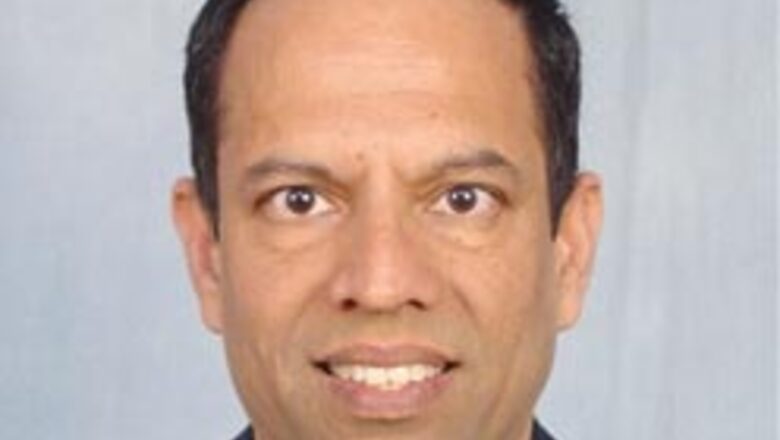
views
As Union Budget nears, all eyes are set on the Finance Minister. What lies in store for the software industry in Chidambaram's 7th Budget?
Will the US recession have an impact on the Indian scene? Will there be any special measures for R&D?
To find out all the answers, IBNLive.com organised an online chat with Dr Anil Gupta, COO, Aditi Technologies.
Here we reproduce the full text of his chat.
Srinivas: What is Aditi Technologies' stand towards going Green? Today all major IT organizations are directing energies going green. Any comments on the initiatives taken by your organization?
Dr Anil Gupta: Srinivas, I love this question. Aditi is a highly socially conscious company. I would love to form a coalition of IT industry to lead efforts to go green. We have already started initiatives to cut down energy usage, but are yet to launch a major campaign. You can be sure we will do something in this area.
DS: What would be the key catalyst for Indian companies to have more focus on R&D? What would be those technologies? And lastly, what would be the typical ROI in years for R&D activities?
Dr Anil Gupta: Indian companies are putting more focus on R&D. We can see this in the automotive sector; in pharmaceuticals, and in other areas. R&D ROI does take time, but is an excellent long-term way to improve competitiveness. We will continue to see greater R&D focus in India.
Aditi: For any company to grow Infrastructure and facilities are very important & contribute significantly to the company's growth. If the IT department of the company is not upto the mark , then the company will not be able to deliver world-class products considering the time constraint. What is your take on this?
Dr Anil Gupta: I agree. This is a good point.
Srinivas: With the assumption that STPI is withdrawn, the shadow looming over shall hit the bottomline of every organization. Is there a strong lobby from the IT Sector to the Government on its extension?
Dr Anil Gupta: I believe that NASSCOM is doing a good job of expressing the concerns of the IT industry to the government.
SS: What is your view on 10A/10B? Do you think this will be extended in some form or the other? Or, will it just disappear next year?
Dr Anil Gupta: There may be an extension for small and medium companies.
Puneet120: I think nowadays where the world economy is very volatile, companies like Aditi should consider some secondary markets like Australia and other eastern nations. The Government should also optimise the policies according to that. Any comments?
Dr Anil Gupta: Yes, companies should diversity. Always a good idea. But I don't think the government needs to play a role.
KKP: R&D is the key for sustaining in the longer run. Do you see/expect anything specific in the Budget which would help R&D in India to be promoted further (specific consideration for R&D)? If yes, can you highlight what expectation would you be keeping from FM?
PAGE_BREAK
Dr Anil Gupta: R&D is a critical area of focus for India for long-term growth. R&D already gets incentives, though we might see more. It is hard to predict.
Dev: How important is infrastructure for a company to grow?
Dr Anil Gupta: Human infrastructure is the most important area. Physical infrastructure does matter, but Indian IT industry has been able to find ways around it.
Rishi: Sir, I'm in R&D sector of Mahindra automotive. So I want to know what is the future of automobile companies of India. Can it be hit by US recession?
Dr Anil Gupta: Any industry can be hit. It is best for the employees to keep upgrading their skills.
DS: Why is it that Indian IT companies either do outsourcing/ staffing and do not get into product development? Is it because there are not enough VCs around? Or the product market is more outside India and time to market /sale would be higher?
Dr Anil Gupta: India's IT companies have a history of services business. However, India is doing well in developing products now, even though the number is modest. I believe you will see an increase.
Abhi: Will companies move outside Bangalore because of traffic issues and higher labour cost?
Dr Anil Gupta: Bangalore does have high cost and traffic issues. However, Bangalore also has great talent. I do see more growth in Tier 2 and 3 cities than in Tier 1 cities.
Adhiraj Badyal: Anil, what, according to you, are the top 3 organic growth strategies that Indian IT industry should be employing to keep its edge as #1 IT exporter intact? Do you see any strategic shift in the way we do business?
Dr Anil Gupta: 1. Focus on adding greater value to clients 2. Focus on employees as simple as that.
DS: What is current investment by the Indian Govt for R&D in terms of % with GDP? And what % do you think the Govt should invest?
Dr Anil Gupta: I do not know the exact figure, but India's investment in R&D needs to grow significantly. It should be done by the private sector, not the government.
Srinivas: What are the predictions from IT companies on the withdrawal of STPI benefits by 2009? There has been a speculation on its extension. Is it on the cards?
Dr Anil Gupta: There may be an extension for small and medium enterprises, but I am doubtful of a general extension for the entire industry.
Nalini: Several companies have quite gone public about minimal wage increase in the coming fiscal year; some companies are even 'trimming' their bench strength. Do you see this as the end of the honeymoon period for IT professionals? Is this a sign of the industry maturing?
Dr Anil Gupta: Nalini, no, I see no end to opportunity in the IT industry. You just have to keep up your skills, whether they are technical skills or soft skills. Demand for strong professionals remains as strong as ever and they will continue to see good salary growth.
Benazir: Do you think the Budget this year will be favourable to the IT/software industry due to rupee appreciation?
Dr Anil Gupta: I think the Budget will have some good news for the industry, though many requests will not be granted. The decline of dollar will (and should) create greater rationale and I believe this will influence the Finance Minister.
PAGE_BREAK
Suraj Ray: As your company's revenue comes mainly from the US, do you think US recession will affect your sustainability in India?
Dr Anil Gupta: Suraj, it is good to have diversification of revenue by geography, but it is far more important to have satisfied customers and employees.
Kashyap: Does Aditi plan to develop any product like Talisma again?
Dr Anil Gupta: Kashyap, Stay tuned!
Adhiraj Badyal: Do you think that the captive setups adopted by more and more MNCs may eventually impact the bottomlines of Indian service providers?
Dr Anil Gupta: There is no evidence that the proportion of work done by captives has increased. In any case, most large companies adopt a dual approach that includes captives and outsourcing. I do not see this as a challenge.
Puneet120: Considering the present scenario, there are many companies firing their employess. Is Aditi Tech also considering to take such steps in the near future?
Dr Anil Gupta: Puneet, throughout history, companies have focused on retaining top employees, and on helping marginal employees be more effective. When this does not succeed, it can lead to the employee being asked to leave. To the extent the company has been fair about the process, there is nothing wrong with this. This has nothing to do with present scenario. Even in the best of times, companies need to focus on talent management.
GajendraMoond: Agriculture is one of the most ignored sector from the private firms' point of view. Can't we synthesize our IT with agriculture industry to uplift the poor farmers and hence the nation? Is there any way to make a foray into such a field and have a win-win both for IT and agriculture?
Dr Anil Gupta: Good question, but I do not know enough to answer this question.
Sandeep: In India, companies are not inventing in R&D work. They are fully dependent upon US for this. And that is why IT employees in India are always getting back office or support work mostly. So expecting from those guys to design something new, how much of it is justified?
Dr Anil Gupta: Sandeep, This is a good question. I am confident employees in India are capable of doing good R&D and many are already doing so. However, a material increase will require more skills training and management focus. This is entirely possible, but will take focus and time.
Dev: Are there any plans for Aditi to merge with Talisma again?
Dr Anil Gupta: Dev, no such plan.
Vipul: With recession and appreciation of rupee to continue for sometime, don't you think Indian companies should look towards exploring other markets big time now?
Dr Anil Gupta: Vipul, absolutely. And Indian IT companies are very much doing this by focusing on Europe and other countries in Asia.
PAGE_BREAK
Gurjeet: What are your views about STPI extension especially for smaller IT companies?
Dr Anil Gupta: Gurjeet, STPI extension for smaller and medium IT companies is a good idea, especially in light of the change in exchange rate.
Chetan L: Do you foresee continued appreciation of the rupee? What should Indian IT companies do in order to tide over the pressure on margins? What expectations do you have from the current budget to help address this challenge?
Dr Anil Gupta: No one can predict currency markets and I will not try. IT companies, like any company, should try to find ways to be more competitive. I do not have any specific expectations in the budget tied to the exchange rate.
G K Kashyap: Considering the fact the rupee has appreciated against the dollar by approximately 11%, the IT and Textile industry were the worst hit. Do you expect some sort of special package for these two industries in the coming budget? What can the R&D sector expect from the FM?
Dr Anil Gupta: I do not expect any specific package that is tied to decline of the dollar (by the way, the rupee has not appreciated much; it is the dollar that has declined for the most part). I do think the government is sensitive to the impact of the Rs/$ exchange rate. The government can influence this rate and I believe will do so within reasonable limits.
Chetan L: Core R&D is integral to the building of a nation. Organisations in India do not invest much on R&D which would eventually help them be more competitive and stay ahead in the global market. How should the FM encourage R&D in Indian companies? Do you see the need for tax sops to organizations to encourage investment in R&D?
Dr Anil Gupta: Chetan, further tax incentives for R&D would be a great idea to help India be more competitive in the long term.
GajendraMoond: How do you see the future of the outsourcing business in India? What does this year's Budget have to offer to boost this business?
Dr Anil Gupta: Gajendra, I see a bright future overall. The industry is healthy and can weather a storm, if there is one. The Budget should have some good news.
Abhi: Considering current recession, what do you think is safe for employees: Working at bigger companies or smaller ones?
Dr Anil Gupta: Abhi, As I've responded in my previous replies: it is important to work for a company that focuses on good work, adds good value to its customers, and treats it employees well. It does not matter that the company is big or small.
Kewal Khanna: Declining US dollar has hit the Indian IT industry hard. One of the charges levied against Indian IT industry is that it's not doing sophisticated work but only outsourcing? Today China is turning out to be a big competitor to India spending more for R&D to beat India. Should not the Budget provide higher concessions for R&D in the industry?
Dr Anil Gupta: Kewal, I agree that concessions to do more R&D are desirable. They will help India become more competitive.
Serendipity: What do u feel about the FBT? Isn't that a regressive measure? Don't you think the FM should scrap that?
Dr Anil Gupta: You are right on. The FBT is a complex law that adds significantly to the cost of doing business. The FBT on stock options, in particular, is unnecessary. The employee would have paid the tax to the government anyway. With a steep growth in tax revenues, it is a good time to reconsider FBT.
PAGE_BREAK
Adhiraj Badyal: With so many sectors competing for budgetary support from the FM, what makes you think that IT/software has a case for getting more sops? I ask this question because IT, which contributes around 6% to national GDP, can now be categorized as a mature industry and not a nacsent one.
Dr Anil Gupta: Adhiraj, the IT industry has presented some legitimate requests to the FM and I believe many will be granted. At the same time, you do bring up a good point and the industry may not see quite as many sops as it has seen before.
Aditi: Is it good for an employee to work in a Product Development Company or a Services Company?
Dr Anil Gupta: It is good to work for a company that does a good job with whatever it does; has satisfied customers; and values its employees. It is less about a product development company or a services company.
Subhasis Das: How will the Budget2008-09 affect the IT sector?
Dr Anil Gupta: Subhasis, I expect positive news for the IT sector. The sector may not see its entire wish list granted, but I do think there will be good news.
Dileep: Do you think Indian Software companies can always survive depending on US/Europe Economy? Wouldn't it be good, if we even look at India as a potential software market and do our expansion plans?
Dr Anil Gupta: Dileep, This is a good idea. Indian IT companies are indeed focusing on Indian economy as well as the growing economies in other parts of Asia.
Kumar: What is the impact of US economy slowdown on Product Development companies (MNCs, not Indian companies) in India?
Dr Anil Gupta: Good companies will continue to invest in R&D and build products for long term competitive advantage. Hence, recession or not, I feel the R&D and product development focus will not come down.
A: What do you feel is the challenge before India in IT in the next 5-10 years?
Dr Anil Gupta: A sustainable talent pipeline is by far the number 1 challenge of the IT industry in India.
Kunal Ojha: What according to you will be the prime force to keep up the momentum within the software industry as it has been in the last decade? Especially considering the ineffectiveness that has crept in the present outsourcing market due to rising salaries?
Dr Anil Gupta: Kunal, The IT industry MUST move up the value chain and take on more sophisticated work. The industry is doing that, but should put increased focus. This is the only way to grow and be competitive. Somebody else, somewhere else, can always do the job cheaper.
Vivan: Hi, what is the social responsibility of software industry? How can minimize risk in the common people, those who lost their jobs because of unstabilised policy of government and companies?
Dr Anil Gupta: Vivan, Social responsibility should be a key part of any company's core values. I am a believer in Gandhi's philosophy on this. He felt the role of the capitalist is to create wealth, only to redistribute it to those who will benefit most. The companies should also focus on upgrading the skills of employees so they remain employable.
PAGE_BREAK
Murali S: While people demand a hike when a company does good, I think it is fair for companies to cut salaries when there is a business need. What is your opinion?
Dr Anil Gupta: I think it is fair for the company to link employee's pay to the results the employee brings to the company. If there is a slowdown, it is a good opportunity for strong performers to demonstrate their value and rise up.
Murali S: R&D is the key for any nation's growth, with the kind of recession we are facing now. The obvious choice for cost cutting will be 'Research Departments'. I see this as a threat to our growth. May I know your opinion.
Dr Anil Gupta: You are right: R&D is the key for growth. Having studied the R&D investments of many companies, I know that most good companies do not cut R&D. They see R&D as the number 1 way to remain competitive.
Kanchanv: What is your take on companies like Infosys making 100% pay as variable and other companies following similar measures? What would be the long term impact of this?
Dr Anil Gupta: Employees with strong skills have the opportunity to make more money in this environment. At the same time, employees with weak skills will face pressure.
Benazir: More and more companies are preferring China for outsourcing deals. Do you think this is primarily because of the Rupee appreciation? What measures do you think the government should take to address this concern?
Dr Anil Gupta: Benazir, China has good educational infrastructure and good physical infrastructure. It is also a huge market in itself with a large number of MNCs. I feel that is what is leading to growth of IT business in China. India should focus on its own needs and do what is right for us. There is no need to compete with China per se.
KKP: What according to you would be the top 2-3 things which you would like to see in this Budget that can boost the IT industry?
Dr Anil Gupta: 1. Incentives to upgrade India's educational infrastructure. 2. Incentives to upgrade India's physical infrastructure. 3. Incentives to do more R&D in India.
Puneet120: What is the nature of recession -- deep or very marginal?
Dr Anil Gupta: No one knows the answer and I will not guess. There are credible economists on both sides of the argument.
Satadru Karjee: What do you think would be the biggest impact on the Indian Software Services sector with the impending fears of US recession?
Dr Anil Gupta: Satadru, this will put more pressure on companies to add value to customers and to have the best talent in-house. I see the industry continuing to increase revenue at a healthy rate. However, employees with weak skills may see a risk to job security.
Lokesha: What actions can be expected from FM to reduce the impact of US recession on Indian IT market?
Dr Anil Gupta: Lokesha, NASSCOM had presented a good list to the Finance Minister in November 2007. I think the FM will adopt some of the recommendations and this will help the IT companies.
Balaji: What are your strategies to face if recession occurs in this year?
Dr Anil Gupta: Balaji, Aditi continues to focus on cutting edge technologies on both the .NET and Java platform. We are often ahead of others in our adoption of latest technology and in using this advantage to the benefit of our customers. At Aditi, we have an open, non-hierarchical environment that the employees like a lot. We will continue to focus there.
Kiran Rangaswamy: Should government provide tax benefit for both company and employees at a certain place where it is less populated?
Dr Anil Gupta: Kiran, In general, I do not favor such an approach. The idea has some theoretical merit, but I am not confident about government tax benefits as an effective approach. Tier 2 and 3 cities are already seeing a lot of expansion. We should let the market forces decide where the business goes.
PAGE_BREAK
Manoj Kumar: Should I change my job to a new IT company in the current market (IT industry) scenario?
Dr Anil Gupta: Manoj, You should work for a company that values you. A company with an open culture. A non-hierarchical environment. A company that trusts you. A company that does not micromanage you. Where you get good assignments. If your employer does this for you today, you should stay there. If not, you should consider a different environment. The current industry scenario has nothing to do with this.
Puneet: How can we keep up with other Asian countries -- China, Japan, Korea and Asean nations? In software and R&D sector?
Dr Anil Gupta: Puneet, China, Vietnam, and other countries are already posing a challenge to India and I predict this will grow stronger in the future. India must improve its educational infrastructure and physical infrastructure to keep up. China, for example, is far ahead of India on these counts. Puneet, personally, I encourage you to do the very best you can to keep up your skills. Spend extra time every day in addition to your day job to learn more. That is the only way for you to keep up.
Rupal: We all know one of the reasons for booming Indian economy is because of the IT sector. So does the rupee appreciation affect the Indian IT industry? What are the steps taken to overcome the situation which arose after September 2001?
Dr Anil Gupta: Rupal, The decline of the dollar has clearly put pressure on Indian IT companies to think of ways they can add greater value to the customer and charge more. It puts pressure on IT companies to have top employees with strong skills. This is a good time for you to put ever more increased focus on your skills.
Bhupinder: How will the State and Non-State rioting (Started with Mumbai, Maharashtra and now Bangalore, Karnataka) affect the status of software companies and thereafter the Budget which might have something to do with this?
Dr Anil Gupta: Bhupinder, This rioting is terrible. But I don't think this particularly affects software companies any more than anyone else.
Vinod: Do you think FM should reduce / take off services tax for software companies?
Dr Anil Gupta: Vinod, Yes, this will be a good idea, especially in light of the decline in US dollar.
DS: Do you think there should be a special tax slab for employees working in IT sector, if the Rupee keeps depreciating?
Dr Anil Gupta: DS, I don't think there should be special tax slab for employees in the IT sector. We should pay taxes the same way everyone else does.
Niyati: Aditi Technologies has a large dependence on US market. What are your views on the impact of US recession to Aditi and its like companies?
Dr Anil Gupta: Niyati, If the recession is moderate as it is currently expected, Indian IT companies will probably see an increase in business as US companies will see this as an avenue to be more competitive. However, if the recession is deep, there will a reduction in the growth rate of IT companies in India.




















Comments
0 comment